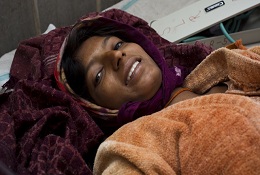PRACHAR: Promoting Change in Reproductive Behavior in Bihar, India
Funded by the David and Lucile Packard Foundation (with supplemental funding from UNFPA in 2009), PRACHAR, meaning "promote" in Hindi, was a twelve year innovative program which successfully changed reproductive behaviors of young couples and the social norms that pressure unmarried adolescents into early marriage, early child bearing, and inadequate child spacing in India.
Worldwide, few programs have addressed youth fertility and demonstrated results. The PRACHAR model adopted a unique approach to address youth fertility in India and was implemented across India's state of Bihar.
PRACHAR tested a government—non-governmental organization partnership model to change youth reproductive behavior through education on reproductive health and family planning by frontline government health workers.
Through the PRACHAR model, adolescents were presented with information they needed to make responsible reproductive decisions when they marry. At the same time, young couples were motivated to adopt a contraceptive method of their choice to delay their first child and to space the second child, and to continue using a contraceptive method.
Over its twelve years, PRACHAR reached approximately 960 villages, with populations totaling more than 10 million through project interventions.
Between 2009 and 2013, Pathfinder built the capacity of 994 ASHA and 176 Male Communicators to provide adolescent women and men with the thorough and accurate health information they need. By integrating the PRACHAR model into the state’s health care system, the project’s proven outcomes—increased contraceptive use and delayed marriage and first birth—can have greater reach across India.
Visible Results
Young women part of PRACHAR married about 2.6 years later than women not exposed to PRACHAR. They also had their first birth 1.5 years later.
Adjusting for education, caste, and age at marriage, young women in the PRACHAR intervention area were almost five times more likely to use contraception before the first birth compared with women in the comparison area.
Even though the PRACHAR project has ended, Pathfinder has ensured that our mechanism to train and supervise ASHA is embedded in Bihar’s public health system. The government has also issued guidance that these door-to-door health workers will continue to collect data during their visits with youth, as under PRACHAR, and will continue to receive incentives for promoting birth spacing.

Related Publications
PRAGYA: Multisectoral, Gendered Approach to Improve Family Planning and Sexual and Reproductive Health for Young People
PRAGYA, meaning "insight" in Sanskrit, is a mixed methods study commissioned by USAID and conducted by Pathfinder India to improve understanding of the effects of Phases I and II of the PRACHAR project.
PRACHAR: Advancing Young People’s Sexual and Reproductive Health and Rights in India
This technical brief summarizes the evolution of PRACHAR, describes the intervention model and key evaluation results that informed each phase, and highlights next steps for dissemination and advocacy based on 11 years of project learning.
Driving Innovation in Sexual and Reproductive Health
In 2012, Pathfinder went where the need was greatest—the places where women, men, and young people must fight every day to defend their sexual and reproductive health and rights. This annual report explores our successes during fiscal year 2012.
The Effect of Reproductive Health Communication Interventions on Age at Marriage and First Birth in Rural Bihar, India
This paper describes the results of a survey of participants in an adolescent education program implemented by the PRACHAR project in rural Bihar.
Related Projects

ANANYA: Shaping Demand and Practice in Bihar for Uptake of Priority Behaviors
PAST PROJECT: ANANYA aims to empower women to make informed decisions about maternal and neonatal health.

Continuum of Care: Addressing Postpartum Hemorrhage in India and Nigeria
PAST PROJECT: Funded by the MacArthur Foundation, this project worked to reduce the morbidity and mortality associated with postpartum hemorrhage in India and Nigeria.

Matrika: Saving Mothers' Lives in India
PAST PROJECT: Pathfinder’s Matrika project brought improved maternal health care to three districts of Uttar Pradesh.
RELATED NEWS
International conference stresses youth's reproductive health rights
Youths are deprived of information and services related to sexual or reproductive health. These issues are considered taboo due to social, cultural or religious norms in the developing and middle-income countries, speakers discussed on the third day of the International Conference on Family Planning, held at the Bali Nusa Dua Convention Centre in Indonesia.
Pathfinder Wins Quality Innovation Challenge
On August 16, the David and Lucile Packard Foundation announced Pathfinder as one of the 2016 Quality Innovation Challenge awardees. The Quality Innovation Challenge is a global call for creative ideas to improve quality in sexual and reproductive health and rights for adolescents and youth.












